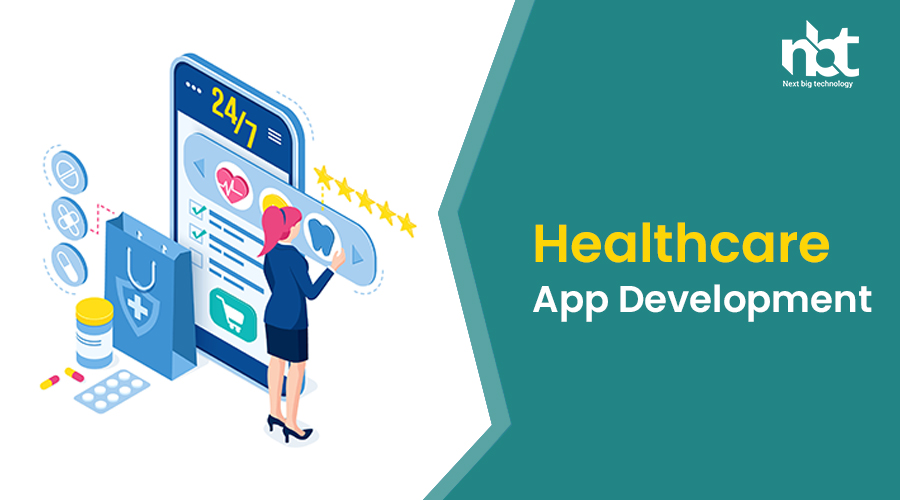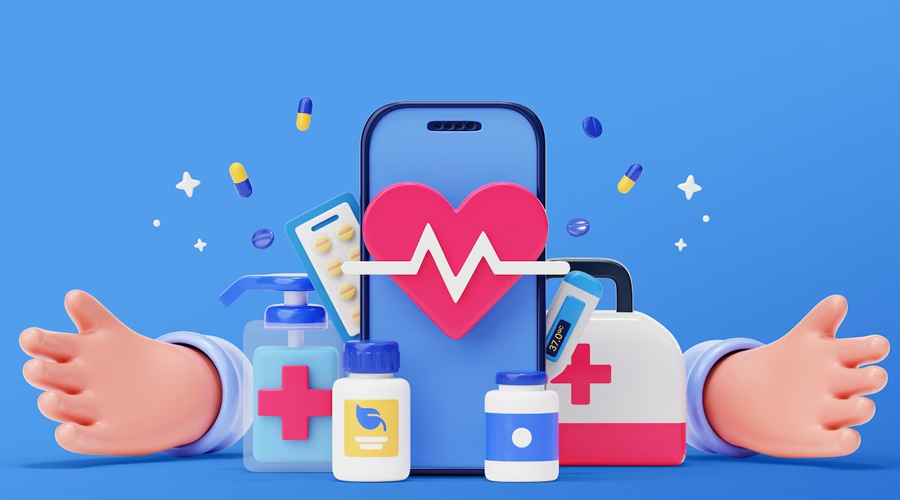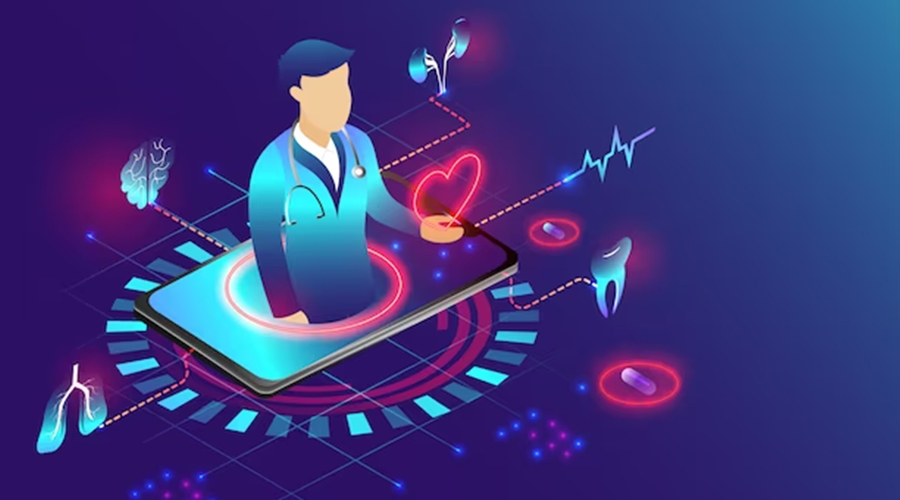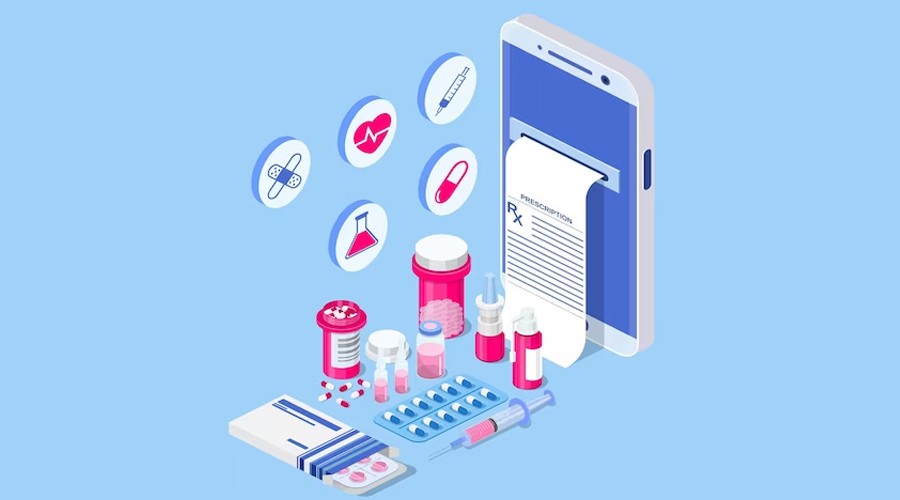Table of Contents
Introduction to Healthcare App Development
In the ever-evolving landscape of healthcare, technology is a driving force propelling the industry towards unprecedented levels of efficiency, accessibility, and patient-centric care. At the forefront of this technological revolution is healthcare app development, a dynamic field that holds the promise of transforming how we approach and experience healthcare. In this in-depth exploration, we will delve into the multifaceted world of healthcare app development, examining its origins, current state, and the profound impact it is having on the healthcare sector.
The Significance of Healthcare App Development:
- Accessibility and Convenience: One of the most notable contributions of healthcare apps is the enhancement of accessibility to healthcare services. These apps break down geographical barriers, providing individuals with the ability to consult healthcare professionals and access essential health information from the comfort of their homes. This is particularly crucial in rural or underserved areas where physical healthcare facilities may be scarce.
- Empowering Patients: Healthcare apps empower patients by putting essential health information and tools at their fingertips. From scheduling appointments to accessing personal health records and monitoring vital signs, patients can take a proactive role in managing their health. This shift towards patient empowerment contributes to improved health outcomes and fosters a sense of engagement and responsibility.
- Streamlining Administrative Processes: Healthcare app development streamlines administrative processes within healthcare facilities, leading to more efficient resource utilization. Features such as online appointment scheduling, automated billing, and electronic health records contribute to a reduction in paperwork, administrative overhead, and overall operational costs.
- Telemedicine and Remote Monitoring: Telemedicine, facilitated by healthcare apps, has emerged as a transformative force, especially in times when remote healthcare delivery is essential. Virtual consultations, remote monitoring of patients, and the integration of telehealth services into healthcare apps ensure that individuals can receive timely and quality care without the need for physical presence.
- Data-Driven Healthcare: The vast amount of data generated by healthcare apps is a goldmine for healthcare providers and researchers. This data can be utilized to identify health trends, track the prevalence of diseases, and gain insights into population health. The transition towards data-driven healthcare enables evidence-based decision-making and the implementation of targeted interventions.
Key Features Shaping Healthcare Apps:
- Appointment Scheduling and Reminders: Healthcare apps streamline the appointment scheduling process, allowing users to book, reschedule, or cancel appointments seamlessly. Automated reminders reduce no-show rates and contribute to better resource management within healthcare facilities.
- Telemedicine and Virtual Consultations: The integration of telemedicine features enables users to connect with healthcare professionals remotely. This not only improves accessibility but also ensures continuity of care, particularly for individuals with chronic conditions or those residing in remote areas.
- Electronic Health Records (EHR) Management: Healthcare apps provide a secure platform for managing electronic health records. Patients can access their medical history, test results, and prescriptions, while healthcare providers benefit from a comprehensive view of patient health for more accurate diagnosis and treatment.
- Medication Management and Adherence: Medication management features, including reminders and prescription tracking, promote medication adherence. This is crucial for individuals managing chronic conditions, as missed doses can lead to complications and compromised health outcomes.
Challenges and Considerations in Healthcare App Development:
- Data Security and Privacy: As healthcare apps handle sensitive personal health information, ensuring robust data security and privacy measures is paramount. Developers must adhere to industry regulations and standards to safeguard patient data from unauthorized access or breaches.
- Interoperability: Achieving interoperability among various healthcare systems and apps remains a challenge. Seamless integration with existing healthcare infrastructure is crucial to ensure the smooth exchange of information between different platforms.
- User Adoption and Engagement: The success of healthcare apps hinges on user adoption and sustained engagement. Developers must design intuitive and user-friendly interfaces, provide meaningful functionalities, and implement strategies to encourage ongoing usage.
- Regulatory Compliance: Healthcare app developers must navigate a complex landscape of regulations and compliance standards. Adhering to frameworks such as Health Insurance Portability and Accountability Act (HIPAA) in the United States ensures that healthcare apps meet stringent privacy and security requirements.
The Future of Healthcare App Development:
The trajectory of healthcare app development is poised for continued growth and innovation. As technology advances, we can anticipate the emergence of new features and functionalities that further enhance the user experience and contribute to the overall improvement of healthcare delivery. Some potential future developments include:
- Artificial Intelligence (AI) Integration: The integration of AI algorithms into healthcare apps holds the potential to revolutionize diagnostics, personalized treatment plans, and predictive analytics. AI-powered chatbots may also play a role in providing instant, context-aware healthcare support.
- Blockchain for Data Security: Blockchain technology could be leveraged to enhance the security and integrity of health data. Implementing blockchain in healthcare apps could ensure a tamper-proof and transparent record of patient information, reducing the risk of data breaches.
- Virtual Reality (VR) in Healthcare: Virtual reality applications within healthcare apps could be used for therapeutic purposes, pain management, and even medical training. VR has the potential to create immersive healthcare experiences that enhance patient engagement and rehabilitation.
Key Trends Shaping Healthcare App Development
In the dynamic field of healthcare app development, staying abreast of emerging trends is crucial for creating innovative solutions that address the evolving needs of both healthcare providers and patients. As technology continues to advance, several key trends are shaping the landscape of healthcare app development, promising to redefine how we approach healthcare in the future.
1. Artificial Intelligence (AI) and Machine Learning (ML) Integration:
The integration of AI and ML technologies is a transformative trend in healthcare app development. These technologies offer the potential to analyze vast datasets efficiently, providing valuable insights for diagnostics, personalized treatment plans, and predictive analytics. AI-powered algorithms can assist healthcare professionals in making more accurate and timely decisions, leading to improved patient outcomes.
2. Remote Patient Monitoring:
The rise of wearable devices and Internet of Things (IoT) technology has paved the way for remote patient monitoring through healthcare apps. These apps enable continuous tracking of vital signs, chronic conditions, and other health metrics in real-time. By facilitating remote monitoring, healthcare apps empower both patients and healthcare providers to proactively manage health conditions, reduce hospital readmissions, and enhance overall care delivery.
3. Blockchain for Data Security:
Data security and privacy are paramount in healthcare, and blockchain technology is gaining traction for addressing these concerns. Blockchain ensures secure, transparent, and tamper-resistant storage of health records, protecting sensitive patient information from unauthorized access. This decentralized approach enhances data integrity, enabling patients to have greater control over their health data while maintaining confidentiality.
4. Augmented Reality (AR) and Virtual Reality (VR) in Healthcare:
AR and VR technologies are finding applications in healthcare app development, offering immersive experiences for both patients and healthcare professionals. From virtual patient consultations and surgical simulations to therapeutic interventions for mental health, AR and VR enhance medical training, patient education, and treatment options, providing a more engaging and effective healthcare experience.
5. 5G Technology for Enhanced Connectivity:
The advent of 5G technology is revolutionizing connectivity in healthcare apps. With faster and more reliable network speeds, 5G facilitates real-time communication, high-quality video consultations, and seamless data transfer. This enhanced connectivity is particularly crucial for telemedicine services, enabling a more immersive and responsive virtual healthcare experience.
6. Voice-Activated Healthcare Assistants:
Voice-activated healthcare assistants powered by natural language processing (NLP) are gaining popularity. These assistants allow users to interact with healthcare apps using voice commands, making it easier for individuals with limited mobility or those who prefer hands-free interactions. Voice-activated assistants can assist with appointment scheduling, medication reminders, and accessing health information.
7. Personalized Medicine and Genomic Apps:
Advancements in genomics and personalized medicine are influencing healthcare app development. Genomic apps analyze an individual’s genetic information to provide personalized insights into disease risk, drug responses, and preventive measures. Integrating genomic data into healthcare apps enables more tailored and effective treatment plans, marking a shift toward precision medicine.
8. Interoperability and Integration with Electronic Health Records (EHR):
Interoperability remains a key focus in healthcare app development. Ensuring seamless integration with existing EHR systems allows healthcare apps to access and share patient data across different healthcare providers. This interoperability enhances care coordination, reduces duplication of tests, and improves overall continuity of care.
9. Behavioral Health and Mental Wellness Apps:
The awareness of mental health and wellness has grown, leading to an increased demand for healthcare apps addressing behavioral health. These apps offer features such as mood tracking, stress management tools, and virtual counseling sessions. As the stigma surrounding mental health diminishes, the integration of such features into healthcare apps becomes essential for comprehensive and holistic care.
10. Regulatory Compliance and Data Standards:
As healthcare apps become more prevalent, ensuring compliance with regulatory standards and data protection laws is paramount. Developers are increasingly focusing on adhering to guidelines such as the Health Insurance Portability and Accountability Act (HIPAA) to safeguard patient information. Stricter adherence to regulatory requirements enhances trust among users and healthcare professionals alike.
Importance of Data Analytics in Healthcare Apps
In the rapidly evolving landscape of healthcare, data analytics has emerged as a cornerstone in reshaping the industry. The integration of data analytics into healthcare apps represents a revolutionary stride toward optimizing patient care, enhancing operational efficiency, and driving informed decision-making. This article explores the profound importance of data analytics in healthcare app development, delving into its applications, benefits, and the transformative impact it has on the delivery of healthcare services.
Understanding Data Analytics in Healthcare Apps:
Data analytics in healthcare apps involves the systematic analysis of vast datasets generated by patients, healthcare providers, and various medical devices. The goal is to derive meaningful insights, patterns, and trends that can inform decision-making processes, improve patient outcomes, and streamline healthcare operations.
Applications of Data Analytics in Healthcare Apps:
- Predictive Analytics for Disease Prevention: Healthcare apps leverage predictive analytics to assess an individual’s health data and identify potential risks for diseases. By analyzing patterns in patient data, these apps can predict the likelihood of specific health issues, enabling proactive interventions and preventive measures.
- Personalized Treatment Plans: Data analytics plays a crucial role in tailoring treatment plans to individual patient needs. By analyzing patient demographics, genetic information, and historical health data, healthcare apps can recommend personalized treatment options, optimizing the effectiveness of medical interventions.
- Operational Efficiency and Resource Optimization: Healthcare facilities generate vast amounts of operational data. Data analytics in healthcare apps helps optimize resource allocation, reduce wait times, and enhance overall operational efficiency. This ensures that healthcare providers can deliver timely and effective care.
- Real-time Monitoring and Alerts: Real-time data analytics in healthcare apps allows for continuous monitoring of patient vitals and other health metrics. Any anomalies or deviations from normal parameters trigger alerts, enabling healthcare professionals to intervene promptly, even remotely.
- Population Health Management: Healthcare apps with robust data analytics capabilities contribute to population health management by analyzing demographic trends, disease prevalence, and healthcare utilization patterns. This information aids in developing targeted public health initiatives and resource planning.
- Medication Adherence and Patient Engagement: Data analytics tools can analyze patient behavior and adherence patterns regarding prescribed medications. This information is invaluable in developing strategies to improve medication adherence and enhance patient engagement through personalized interventions.
Benefits of Data Analytics in Healthcare Apps:
- Enhanced Patient Outcomes: The ability to analyze and interpret patient data empowers healthcare professionals to make more informed decisions, leading to better patient outcomes. Predictive analytics, in particular, facilitates early detection and intervention, reducing the severity of illnesses.
- Cost Savings and Resource Optimization: Data analytics helps healthcare providers identify areas of inefficiency and optimize resource allocation. This leads to significant cost savings by reducing unnecessary procedures, minimizing hospital readmissions, and improving overall operational efficiency.
- Personalized and Preventive Care: Healthcare apps equipped with data analytics provide a platform for personalized and preventive care. By understanding individual patient needs and risks, healthcare providers can offer tailored interventions, reducing the likelihood of adverse health events.
- Improved Diagnostic Accuracy: Advanced analytics tools contribute to improved diagnostic accuracy by analyzing a multitude of data points, including medical imaging, genetic information, and patient history. This assists healthcare professionals in making more precise and timely diagnoses.
- Efficient Clinical Trials and Research: Data analytics accelerates the pace of medical research and clinical trials. By analyzing large datasets, researchers can identify potential candidates for trials, assess treatment efficacy, and uncover new insights into disease mechanisms.
- Streamlined Healthcare Operations: Operational analytics in healthcare apps streamline administrative processes, reducing paperwork and improving overall efficiency. This enables healthcare facilities to focus more on patient care and less on administrative tasks.
Challenges and Considerations:
While the benefits of data analytics in healthcare apps are substantial, it’s essential to acknowledge and address the associated challenges. These challenges include data security and privacy concerns, interoperability issues, and the need for standardized data formats. Robust data governance policies and compliance with regulations such as HIPAA are crucial to mitigate these challenges and ensure the responsible use of healthcare data.
The Future of Data Analytics in Healthcare:
As technology continues to advance, the future of data analytics in healthcare holds even greater promise. The integration of artificial intelligence (AI) and machine learning (ML) algorithms into healthcare apps will further enhance predictive analytics, enabling more accurate risk assessments and personalized treatment recommendations. Additionally, the interoperability of healthcare systems will improve, allowing for seamless data exchange between different healthcare entities.
Integration of Telemedicine Features in Healthcare Apps
In recent years, the integration of telemedicine features into healthcare apps has emerged as a transformative trend in the healthcare industry. Telemedicine, the remote delivery of healthcare services through technology, has revolutionized patient care by breaking down geographical barriers and providing unprecedented access to medical expertise. This article explores the multifaceted aspects of integrating telemedicine features into healthcare apps, examining the benefits, challenges, and the future implications of this innovative approach.
I. Understanding Telemedicine:
- Definition and Scope: Telemedicine encompasses a broad spectrum of healthcare services delivered remotely, including consultations, diagnoses, and treatment plans. Integrating telemedicine features into healthcare apps extends these services to patients’ fingertips, facilitating virtual interactions with healthcare professionals.
- Types of Telemedicine Services: Telemedicine services include synchronous interactions, such as real-time video consultations, and asynchronous interactions, involving the exchange of patient information and medical records. Healthcare apps can incorporate both types, offering a comprehensive telehealth experience.
II. The Benefits of Telemedicine Integration:
- Enhanced Accessibility: The primary advantage of integrating telemedicine into healthcare apps is the improved accessibility of healthcare services. Patients, especially those in remote or underserved areas, can connect with healthcare providers without the constraints of geographical distance, leading to timely and efficient healthcare delivery.
- Convenience for Patients: Telemedicine features in healthcare apps empower patients to schedule virtual consultations at their convenience. This flexibility eliminates the need for time-consuming travel, reducing the burden on patients, particularly those with chronic illnesses or mobility limitations.
- Optimized Resource Utilization: By offering virtual consultations, healthcare apps contribute to the efficient use of healthcare resources. This optimization includes reduced waiting times, better appointment scheduling, and the ability to manage patient volumes effectively.
- Continuity of Care: Telemedicine integration ensures continuity of care, allowing patients to maintain regular contact with healthcare professionals. This is particularly crucial for individuals with chronic conditions who require ongoing monitoring and adjustments to their treatment plans.
- Cost Savings: For both patients and healthcare providers, telemedicine can lead to significant cost savings. Patients save on travel expenses, and healthcare facilities can reduce overhead costs associated with maintaining physical infrastructure.
III. Key Features of Telemedicine Integration in Healthcare Apps:
- Secure Video Conferencing: Healthcare apps with telemedicine features should incorporate secure and HIPAA-compliant video conferencing capabilities to facilitate real-time consultations. Ensuring the privacy and security of patient information is paramount.
- Electronic Health Records (EHR) Integration: Seamless integration with electronic health records allows healthcare professionals to access patients’ medical histories during virtual consultations, enabling more informed decision-making.
- Appointment Scheduling and Reminders: User-friendly appointment scheduling features and automated reminders enhance the patient experience and help manage virtual consultations efficiently.
IV. Challenges and Solutions:
- Regulatory and Legal Challenges: Telemedicine integration faces regulatory and legal challenges, including licensure issues and varying state regulations. Healthcare apps must navigate these complexities by adhering to relevant guidelines and ensuring compliance with local laws.
- Technical Barriers: Connectivity issues, varying levels of digital literacy, and disparities in access to technology pose technical barriers to telemedicine adoption. Addressing these challenges requires a concerted effort to improve infrastructure and provide education on technology use.
- Security Concerns: Given the sensitive nature of healthcare data, security concerns are paramount. Healthcare apps must implement robust security measures, such as end-to-end encryption and secure data storage, to safeguard patient information.
- Resistance to Change: Healthcare professionals and patients may exhibit resistance to the shift towards telemedicine. Comprehensive training programs and educational initiatives can help alleviate concerns and promote acceptance of telemedicine as a valuable healthcare delivery method.
V. Future Implications and Trends:
- Integration with Wearable Devices: The future of telemedicine integration involves leveraging wearable devices to gather real-time health data. Healthcare apps can sync with these devices, providing healthcare professionals with a holistic view of patients’ health and enabling personalized care plans.
- Artificial Intelligence (AI) and Telemedicine: AI-powered algorithms can enhance telemedicine services by analyzing medical data, assisting in diagnostics, and providing decision support. Healthcare apps can integrate AI features to improve the accuracy and efficiency of virtual consultations.
- Blockchain for Security and Interoperability: Blockchain technology holds promise for addressing security concerns and ensuring interoperability of health data across different platforms. Future telemedicine features may incorporate blockchain to enhance data integrity and streamline information exchange.
Case Studies: Successful Healthcare App Implementations
In the ever-evolving landscape of healthcare, the implementation of innovative technologies, particularly healthcare apps, has proven to be a game-changer. These digital solutions address critical challenges within the industry, enhancing patient care, optimizing workflows, and improving overall healthcare outcomes. In this article, we will explore case studies of successful healthcare app implementations, highlighting their impact on healthcare providers, patients, and the industry as a whole.
1. Teladoc: Pioneering Telemedicine
Background: Teladoc is a trailblazer in the telemedicine space, providing virtual healthcare services through its user-friendly app. The platform connects patients with licensed healthcare professionals for remote consultations, offering a wide range of medical services.
Implementation and Impact: Teladoc’s implementation has significantly improved accessibility to healthcare services, especially for individuals in rural or remote areas. A case study conducted in a rural community in the United States showcased a 30% reduction in emergency room visits after the introduction of Teladoc. Patients appreciated the convenience of virtual consultations, leading to higher patient satisfaction rates.
Key Takeaways: Teladoc’s success underscores the importance of telemedicine in enhancing accessibility and reducing healthcare disparities. The app’s ease of use and broad spectrum of services have positioned it as a vital tool in the modern healthcare landscape.
2. MyChart: Empowering Patients with Health Records Access
Background: MyChart, developed by Epic Systems Corporation, is a patient portal app that provides individuals with secure access to their health records, appointment scheduling, and communication with healthcare providers.
Implementation and Impact: Several healthcare systems, including the Cleveland Clinic, have successfully implemented MyChart to improve patient engagement. By granting patients access to their health records, test results, and treatment plans, MyChart has empowered individuals to take a more active role in their healthcare. This increased engagement has led to better adherence to treatment plans and improved health outcomes.
Key Takeaways: MyChart exemplifies the impact of giving patients control over their health information. The app fosters a collaborative relationship between healthcare providers and patients, ultimately contributing to improved patient outcomes.
3. Zocdoc: Streamlining Appointment Scheduling
Background: Zocdoc is a healthcare scheduling app that allows users to find and book appointments with healthcare providers. The platform aims to simplify the appointment scheduling process and reduce wait times for patients.
Implementation and Impact: In a case study conducted in a large urban medical center, the implementation of Zocdoc resulted in a 20% reduction in patient wait times. The app’s user-friendly interface and real-time scheduling capabilities have contributed to increased patient satisfaction. Healthcare providers have also benefited from optimized appointment scheduling, leading to more efficient use of resources.
Key Takeaways: Zocdoc’s success highlights the importance of addressing administrative challenges in healthcare. Streamlining the appointment scheduling process not only improves patient satisfaction but also enhances the operational efficiency of healthcare facilities.
Thanks for reading our post “Healthcare App Development”. Please connect with us to learn more about Hire Flutter App Developer.





















